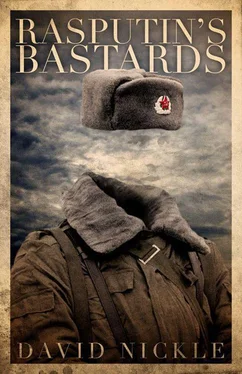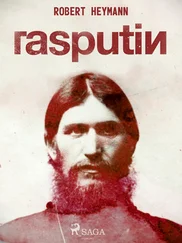The Romanian made a face. “You too?” he said, and reached around to restrain Mrs. Kontos-Wu. “Sorry,” she said, and lashed out with her elbow. The guard made a chuffing sound and collapsed, and Mrs. Kontos-Wu gave herself mild shit. The only dream-walkers in here that she knew about for certain were the Children, and they were also the only ones with reliable instincts that way. Jean Kontos-Wu was a person of this earth. She had to rely on other advantages.
She used those advantages to take down two more Romanians and lock a third in an empty stateroom before she made it halfway back. By the time she’d reached the officers’ quarters, they were waving guns around. Unconvincingly: the Children knew better than to start firing handguns in a submarine.
“Why are you doing this?” said one, who appeared with a short-barrelled shotgun levelled at her midriff. “What is this Kilodovich thing?”
Mrs. Kontos-Wu sighed. “You need to talk to Alexei Kilodovich,” she said. “I can’t do it for you. But he’s—”
The Romanian gasped, and his eyes sprang open. As though he were a computer, and someone had just rebooted him.
The gun lowered, and Mrs. Kontos-Wu gingerly took hold of the barrel. The Romanian let go of the gun.
He muttered a long, incomprehensible string of Romanian.
And then, he began to cry.
Mrs. Kontos-Wu hefted the shotgun and wondered idly if it were loaded with buckshot — and if it were, just how safe it would have been to have fired it. She shivered: she might actually have been at risk.
Mrs. Kontos-Wu shrugged it off. She elbowed past the Romanian and into the wood-panelled corridor.
There were no more Romanians here — just a narrow, dim corridor. The submarine bonged and creaked around her. Partway down, she stopped as a shape emerged from one of the doors.
It was a kid. He looked about fourteen years old. He was fat — as Mrs. Kontos-Wu looked at him, she was amazed to think: This kid looks like Fyodor Kolyokov must have ; even more amazed about what that observation implied.
The kid looked at Mrs. Kontos-Wu with wide, nervous eyes. He mumbled something incoherent. Then he hurried across the hallway to another stateroom. Mrs. Kontos-Wu shrugged and continued on. She glanced into that door, saw the fat kid and another boy, same dark hair, same wide eyes, staring out at her.
So that’s what they look like.
For everything that had happened, Mrs. Kontos-Wu thought this might be the first time that she’d gotten a good look at the Children of City 512.
“Stephen,” said Alexei Kilodovich. “It is okay to open your eyes.”
Stephen had been huddled in a fetal position around his middle, while the Romanians took turns kicking him and lashing him. The beatings had stopped for what Stephen has assumed was just a moment. But in fact, when he opened his eyes he saw that he was alone in the room.
“What’s going on?” said Stephen.
Alexei’s voice filled his mind. “We are having a conference,” he said. “Would you care to listen?”
Stephen trembled. He nodded.
“Then shut your eyes again,” said Alexei.
Stephen did.
And for the first time in his life, he stepped into Discourse.
Fyodor Kolyokov had explained, once, how he dealt with Discourse. They were sitting in the Emissary’s lounge downstairs. Kolyokov was sipping at his fourth bottle of beer, and was a little drunk. Stephen was smoking and paying close attention. Kolyokov was sometimes more forthcoming after drinking and today was not an exception.
It is like , he said, stenography.
Yeah, Kolyokov was forthcoming sometimes, but he wasn’t always clear. What does one have to do with the other ? Stephen wondered.
Ha. You must take notes of what you hear in Discourse. You must then separate the notes into columns — words for each speaker. It is laborious work. The younger ones are better with it and they can just listen. But for us — for me, rather — Discourse requires some concentration.
Stephen had asked a few more questions but Kolyokov was done explaining. You would not understand , he said, not without a hint of cruelty, then winked. Stenography , he repeated and Stephen had left pissed off and confused.
Now, immersed in what was presumably a vigorous round of Discourse, Stephen thought he understood what Kolyokov had meant.
He seemed to be half out of his body this time. He could feel the floor underneath his ass, his ribs still hurt. But there was a sense of dimension around him — a feeling that this tiny room and submarine had been supplanted by a great, dark hall, as though he might be sitting on the edge of a high gallery overlooking this hall; as though the hall below and above him was filled with politicians and supplicants who all spoke at once. Stephen opened his eyes, and he was back in the submarine. But he still had that sense — that maybe these walls were illusory. That the voices that still filled his thoughts were the reality. They talked and shouted and sang; they protested and justified and spun the facts to their advantage; they offered knowledgeable advice and countered it with bland truisms; all at the same time. Just listening, it was impossible to follow.
But stenography. Stephen slapped the floor around him, as though doing so would cause a pen or paper to roll out. But of course the room was bare.
Then he thought about the way that Kolyokov had worked — the way Mrs. Kontos-Wu had worked.
He thought about metaphor.
Stephen closed his eyes again. He thought about a steno pad — a Hilroy, 200-page pad bound with a spiral of silver wire, little quarter-inch-spaced blue lines on each page. He imagined a pencil — a yellow number two with a little pink nipple of an eraser on the back, and lead sharpened to a point on the front. He imagined it. And he saw it. And carefully, listening to what he could, he began to write.
NOTES ON DISCOURSE, wrote Stephen, then he listened. He thought he could make out a number of different voices, so he made columns for each of them:
ALEXEI; ZHANNA; TEENAGE BOY; PREPUBESC GIRL; BOY WITH SPCH IMPED; YOUNG BOY. STRANGE OLD WOMAN.
Then he listened some more — and wrote what he heard.
He found that as he wrote down one voice, another became clearer, and he wrote down that one too — while continuing to inscribe the first. And then he went to the third and the fourth and so on. Before long, he had the metaphorical equivalent of meeting minutes. As it came together, Stephen found himself becoming very impressed — even as he grew more and more disturbed at the implications.
At the end of it, Stephen nodded sadly. Kolyokov had been right about stenography — but he had been wrong about so very much else. When the Discourse ended and the dreamers went off to do what they had to do, Stephen read over his notes despairingly.
ALEXEI:
MY LIFE HAS BEEN A LIE AND NOW I KNOW THE TRUTH. I AM YOUR SIBLING. I AM YOUR FATHER. I CAN MAKE YOU AND I CAN DESTROY YOU. YOU NEED TO BE DESTROYED BECAUSE THE ONE YOU CALL BABUSHKA IS AIMING TO TAKE YOU OVER. SHE HAS ALREADY TAKEN OVER THE ENTIRETY OF THE SLEEPER NETWORK IN AMERICA AND IS WORKING ON EUROPE AND ASIA AS WE SPEAK. SHE HAS COME INTO THE SEA AND USED HER POWER TO DESTROY THE ONES YOU CALL THE MYSTICS. I AM THE KEY TO DESTROYING THIS. YOU ARE FOOLISH TO THINK THAT THE NETWORK CAN BE PRESERVED. HEY — WHICH ARE YOU? DAMN IT THE OLD WOMAN!
ZHANNA:
BABUSHKA IS A KNOWN THREAT AND WE WILL DEAL WITH HER. WE HOPED TO MAKE A HEAVEN IN WHICH THE SLEEPERS WHO HAD BEEN SO ILL-USED BY OUR MASTERS COULD BE SHOWN THE WAY TO FREEDOM AND PEACE. WE HAD HOPED TO RETURN THE CONTROLS OF EVERYONE TO THEMSELVES. THIS WAS VLADIMIR’S DREAM. IT IS A GOOD DREAM. WE DO NOT NEED TO DESTROY THE NETWORK. WE NEED TO PRESERVE THE NETWORK. NOT TO HAVE SLEEPERS. THAT IS NOT AS MUCH FUN AS YOU THINK, PETRA. DO NOT CALL ANYONE A BITCH, PAVEL. BLOWING UP NEW POKROVSKOYE SOLVES NOTHING. SHIT! HOW DID SHE —
Читать дальше












